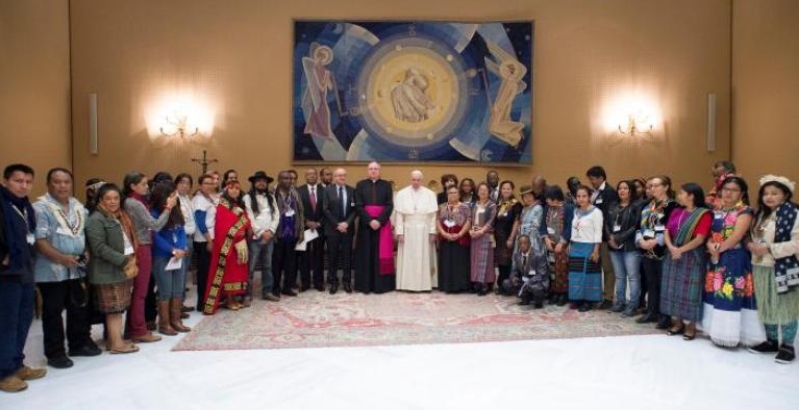
Pope Francis insists indigenous groups must give prior consent to any economic activity affecting their ancestral lands -- a view conflicting with Trump administrators who are pushing to build a $3.8 billion oil pipeline over opposition from American Indians.
Representatives of the Cheyenne River and the Standing Rock Sioux tribes have sued to stop construction on the final stretch of the Dakota Access pipeline, which would bring oil from North Dakota's rich Bakken fields across four states to a shipping point in Illinois, reports Fox News. Tribes' peoples argued the project would prevent them from practicing religious ceremonies at a lake they say is surrounded by sacred ground.
Francis met with representatives of indigenous peoples attending a U.N. agricultural meeting, and Wednesday said the key issue facing them is how to reconcile the right to economic development with protecting their cultures and territories.
He said the issue is both a social and cultural one, regarding the protection of particular characteristics of people and their territories. This is especially clear, he said, "when planning economic activities which may interfere with indigenous cultures and their ancestral relationship to the earth."
The representatives are participating in the Indigenous Peoples' Forum, hosted in Rome, by the U.N.'s International Fund for Agricultural Development (IFAD). The biennial meeting aims to promote greater economic empowerment of indigenous peoples.
The pope said confrontation and conflict can be overcome through "prior and informed consent" of indigenous peoples for initiates proposed by governing authorities.
"In this regard, the right to prior and informed consent should always prevail," he said. "Only then is it possible to guarantee peaceful cooperation between governing authorities and indigenous peoples, overcoming confrontation and conflict."
The Holy Father said the second aspect "concerns the development of guidelines and projects which take into account indigenous identity." He called on governments to recognize "that indigenous communities are a part of the population to be appreciated and consulted, and whose full participation should be promoted at the local and national level."
The Pope said IFAD "can contribute effectively to this needed road map through its funding and expertise."
IFAD was established in 1977 as an international financial institution dedicated to eradicating rural poverty in developing countries. Some 75 percent of the world's poorest people -- 1.4 billion women, children and men -- live in rural areas and depend on agriculture and related activities for their livelihoods.
Francis spoke two days after a US federal judge denied a request by tribes to halt construction of the final link of the project that sparked months of protests by activists aimed at stopping the 1,170-mile line, reports The Guardian.
Thousands of tribe members, environmentalists and concerned citizens set up camps last year on US army corps of engineers land in the North Dakota plains as protests intensified. Pope Francis, who wrote a major encyclical letter in 2015 on climate change and the environment, told the group that new technologies could be legitimate but had to respect the earth.
"Do not allow those which destroy the earth, which destroy the environment and the ecological balance, and which end up destroying the wisdom of peoples," he said.






